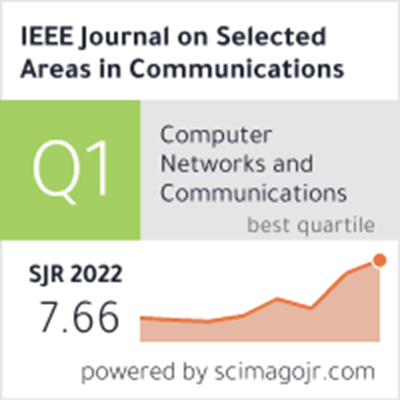聚合无线光网络中回程资源的动态分配
IF 13.8
1区 计算机科学
Q1 ENGINEERING, ELECTRICAL & ELECTRONIC
IEEE Journal on Selected Areas in Communications
Pub Date : 2017-02-01
DOI:10.1109/JSAC.2017.2659023
引用次数: 9
摘要
预计第四代网络的市场普及将支持无线宽带服务日益增长的需求,并确保增强的移动用户体验。在这个方向上,提出了一种具有光回程的无线接入网的收敛性。然而,在这种融合架构中,传统的固定的回程资源分配方式并不有效,需要考虑基站的需求和无源光网络的局限性的新的动态方案。本文研究了不同运营商共享同一光回程网络基础设施的两个相互竞争的基站的资源分配问题。为了研究无源光网络与基站之间的相互作用,提出了一种基于进化博弈论的方法。利用复制器动力学模型,证明了所提出的系统设计是渐近稳定的。此外,本文研究并揭示了时间延迟对所提出的系统设计的影响程度。本文章由计算机程序翻译,如有差异,请以英文原文为准。
Dynamic Allocation of Backhaul Resources in Converged Wireless-Optical Networks
The market uptake of the 4th Generation networks is expected to support the increasing demand for wireless broadband services and ensure an enhanced mobile user experience. In this direction, the convergence of a wireless access network with an optical backhauling has been proposed. However, in such a converged architecture, the traditional fixed commitment of the backhaul resources does not prove to be as efficient, and novel dynamic schemes are required that consider both the needs of the base stations and the limitations of the passive optical network. This paper is concerned with the topic of resource allocation in two competing base stations that belong to different operators and share a common optical backhaul network infrastructure. An approach based on evolutionary game theory is proposed and employed, with a view to examining the interactions among the base stations and the passive optical network. Using the model of replicator dynamics, the proposed system design is proved to be asymptotically stable. In addition, this paper studies and reveals the extent to which time delay can have an impact on the proposed system design.
求助全文
通过发布文献求助,成功后即可免费获取论文全文。
去求助
来源期刊
CiteScore
30.00
自引率
4.30%
发文量
234
审稿时长
6 months
期刊介绍:
The IEEE Journal on Selected Areas in Communications (JSAC) is a prestigious journal that covers various topics related to Computer Networks and Communications (Q1) as well as Electrical and Electronic Engineering (Q1). Each issue of JSAC is dedicated to a specific technical topic, providing readers with an up-to-date collection of papers in that area. The journal is highly regarded within the research community and serves as a valuable reference.
The topics covered by JSAC issues span the entire field of communications and networking, with recent issue themes including Network Coding for Wireless Communication Networks, Wireless and Pervasive Communications for Healthcare, Network Infrastructure Configuration, Broadband Access Networks: Architectures and Protocols, Body Area Networking: Technology and Applications, Underwater Wireless Communication Networks, Game Theory in Communication Systems, and Exploiting Limited Feedback in Tomorrow’s Communication Networks.

 求助内容:
求助内容: 应助结果提醒方式:
应助结果提醒方式:


